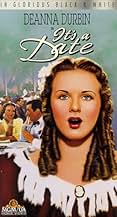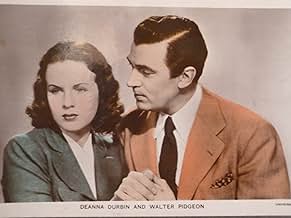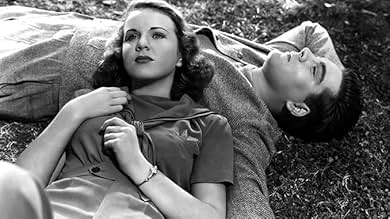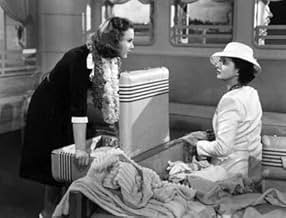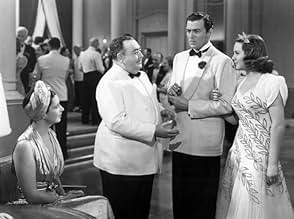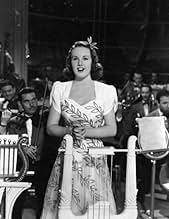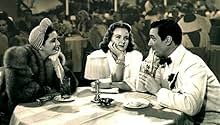Agrega una trama en tu idiomaAn aspiring actress is offered the lead in a major new play, but discovers that her mother, a more seasoned performer, expects the same part. The situation is further complicated when they b... Leer todoAn aspiring actress is offered the lead in a major new play, but discovers that her mother, a more seasoned performer, expects the same part. The situation is further complicated when they both become involved with the same man.An aspiring actress is offered the lead in a major new play, but discovers that her mother, a more seasoned performer, expects the same part. The situation is further complicated when they both become involved with the same man.
- Dirección
- Guionistas
- Elenco
- Premios
- 4 premios ganados en total
- Ship's Steward
- (sin créditos)
Opiniones destacadas
The plot involves aspiring actress Deanna being offered a part that was originally promised to her stage diva mom (Kay). Then, in Hawaii, the plot shifts to a romantic triangle as the two women grapple, not for a part, but for the attentions of a pineapple tycoon, Pidgeon, who's more interested in the mother. The inherent drama in such a situation is jettisoned in favor of standard Universal Pictures sitcom antics. Kay Francis overacts but is never given any good lines, forced too often to simply react to the bubbly, aggressive Deanna.
The first section of the film offers the flavorful ambiance of a theatrical milieu, both Broadway and regional theatre, but then, after Deanna's offered the part of St. Anne, the action shifts to a cruise ship, where Deanna meets Pidgeon, and finally to Hawaii where she reunites with Mom. Once Deanna boards the ship, she leaves behind her quirky boyfriend Freddy, an aspiring actor played by the funny Lewis Howard, who then disappears from the movie. Freddy has a great bit early on where he tries to impress a casting director by acting like a 'dope fiend' which is what he thought Deanna said when she told him to try out for the part of the Dauphin. He starts going into withdrawal tics, rubbing his nose and scratching his arms, a daring bit at a time when the Production Code strictly forbade drug references.
Norman Krasna's script (from a 'story' credited to three writers) offers plenty of bright dialogue and funny bits, but the shifts in setting make it play like three movies crammed into one. William Seiter's heavy-handed direction seems more intent on showing off the lavish (for Universal) sets and less on showing off the actors, giving a bloated feel to the whole enterprise. Deanna's earlier films were leaner, zippier and bursting at the seams with youthful energy. The soundtrack is short on original songs and big on choral standards: Deanna's big numbers are 'Loch Lomond' and 'Ave Maria.'
Deanna plays Pamela Drake and Kay Francis plays her mother, Georgia. Georgia is already a famous and accomplished actress and Pamela dreams of becoming one herself. Well, it soon looks like Pamela's dreams will come true when she reads for a relatively small part--but they offer her the lead! However, she needs to cram and learn the part and goes on a cruise. During this trip, she stays to herself and works on her lines but the Captain and a guest, John Arlen (Walter Pidgen) see her talking to herself and don't know she's rehearsing! They think, incorrectly, that she's really depressed--and John decides to use a scheme to get her to focus on him and his supposed problems. He hasn't got any problems and soon she sees through his ruse--but they become good friends.
When they land, Pamela introduces John to her mother--and tells her that she is in love with John, although he's twice her age. However, over time you aren't certain WHICH lady John is smitten with but things get worse. Soon Pamela realizes that her mother ALSO thinks she's getting the same part that Pamela is rehearsing for--and she doesn't want to disappoint her mother. So what's going to happen? See this cute little family comedy.
As far as Deanna Durbin films go, it's a bit better than average due to a nice cast. In particular, although it's a relatively small role, it's also the first for S. Z. 'Cuddles' Sakall---one of the most likable supporting actors in history. This alone make it a must-see!
By the way, I would love to know what audiences of the day thought about their sweetheart, Miss Durbin, falling for an old guy like Pidgeon. I know that a similar May-December pairing in "That Hagen Girl" was NOT good and audiences hated the film. I think seeing a young lady who everyone adored as a child now with a much older man was just too much-- and this might have also been a problem with Durbin.
When Durbin does get a chance to sing, she's great. She puts over all of her songs with professional skill and poise, doing an absolute standout job on "Ave Maria" and "Musetta's Waltz"--but the trouble is not enough time is spent on the vocals to showcase her amazing voice. Instead, we get Kay Francis and Walter Pidgeon falling in love while Deanna dreams up all sorts of schemes to keep her mother from knowing that she has won her mother's role in a play.
Deanna looks lovely at eighteen and has probably never been photographed more beautifully but this is the sort of vehicle that has you wishing the silly plot would move on so we can hear Durbin sing once more. Walter Pidgeon and Kay Francis are adequate in support. MGM later came up with a zestier technicolored remake called "Nancy Goes To Rio" with Jane Powell.
Trivia note: This was S.Z. Sakall's first screen appearance in an American film.
Kay Francis plays the mother (Georgia) and Deanna Durbin plays the daughter (Pamela), which makes this film eminently watchable. Walter Pidgeon is the man in the middle. At the time of filming, Francis was about 35 and Durbin was about 19, but Deanna had top billing and the meatier role. If Durbin's role had more substance, the film would have been more balanced and more interesting. As it is, the two actresses convey a warmth that compensates for a paucity of laughs.
"Cuddles" Sakall makes his Hollywood debut as the playwright for the show the women covet.
The narrative allows Durbin to display her marvelous pipes, of course. Her vocal numbers are shoehorned into the action, but they don't distract. In fact, they are one of the film's best features.
¿Sabías que…?
- TriviaS.Z. Sakall's American film debut.
- ErroresWhen John Arlen enters Pamela's room with her dress, she is fixing her hair and a hand mirror is on the vanity table close to the table mirror. But on the next cut, the hand mirror has changed position and is now partially sticking over the edge of the table.
- Citas
Karl Ober: I can't work in New York anyway. Is this place far from here?
Pamela Drake: Oh, no, Mr. Ober, it's only Maine. You know where Maine is!
Karl Ober: No.
Pamela Drake: Oh, it's practically a few minutes from here! You could write fine there.
Sidney Simpson: 'A few minutes'!
Pamela Drake: [to Sidney, blithely] Yes!
[to Ober]
Pamela Drake: That's all, really.
Karl Ober: [wagging his finger] Then it isn't quiet enough. I have to go further away from New York.
Pamela Drake: Oh, good - it *is* far away! Takes a whole day to get there.
[to Sidney, brightly]
Pamela Drake: Really, I'm an awful liar, aren't I?
Sidney Simpson: Yes.
- ConexionesEdited into Gems of Song (1949)
- Bandas sonorasLove is All
(1940)
Music by Pinky Tomlin
Lyrics by Harry Tobias
Piano: Cecilia Loftus (uncredited)
Sung by Deanna Durbin (uncredited)
Selecciones populares
Detalles
Taquilla
- Presupuesto
- USD 867,000 (estimado)
- Tiempo de ejecución1 hora 43 minutos
- Color
- Relación de aspecto
- 1.37 : 1
Contribuir a esta página



